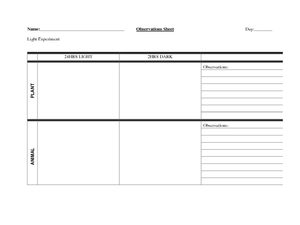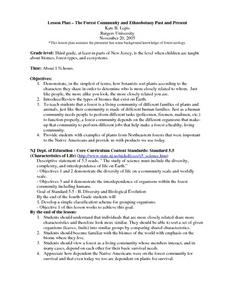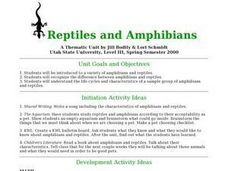Curated OER
What Lives in Water: Pre and Post Activities
In this multiple choice worksheet, learners answer questions about fish and how fish live. After visiting the aquarium, students chart the different creatures they see during their visit and solve mathematical equations of their findings.
Curated OER
Pond Ecology
Fifth graders examine pond ecology, testing how temperature affects the respiration rate of fish. They collect various living things found at a pond, and identify the animal and plant life discovered. They observe a pond community in an...
Curated OER
The Fungus Among Us
Pupils explore the basic characteristics and roles of fungi. They discuss the importance of fungi to humans. Students investigate the relationship between cell structure and function and explore the diversity and variation of eukaryotes....
Curated OER
Organisms – Their Needs
Students compare and contrast different organisms characteristics. In this life science lesson, students design an experiment about plants and animals needs. They collect data and write their conclusion about the experiment.
Curated OER
Kingdom Animalia
Students are introduced to the basic characteristics of the animal kingdom. this lesson is part of a multi-segmented unit on the diversity of life. For this segment, students explore the the members of a few phyla of the animal kingdom.
Curated OER
The Forest Community And Ethnobotany Past And Present
Students describe a forest as a living community. They determine members interact, and in many cases, depend on each other for their basic survival needs. They investigate how dependent the Native Americans were on the forest...
Curated OER
Help the Duck Find Her Babies
Students study the basic need for animals to attract mates and reproduce young.
Curated OER
Diversity of Life
Students identify the difference between eukaryote and prokaryotes and examine the structure of bacteria. For this bacteria lesson students examine the different ways that bacteria are classified through an activity.
Curated OER
Family Life in America: Past, Present and Future
Ninth graders brainstorm the economic and social functions of a family. In groups, they research the roles of each member of a family in the past and compare it with their family today. In groups, they develop criteria for what the...
Curated OER
A Day in a Life of an Arctic/Antarctic Animal
Students, through video segments, explore what types of animals live in the Arctic and Antarctica. They also clear up any misconceptions they have about penguins or polar bears.
Curated OER
Understanding Life System: Growth and Changes in Plants
Third graders research ways in which plants are essential to humans. In this Global Peace lesson, 3rd graders participate in tasks, such as creating a propaganda poster. Students may watch the film, The Lorax, as a closing activity.
Ohio State University Extension
Teen Leadership
Are the young leaders of tomorrow sitting in your classroom right now? Polish their skills to perfection using a series of teen leadership activities. Each lesson promotes both personal growth and team building, while helping scholars...
Discovery Education
Sonar & Echolocation
A well-designed, comprehensive, and attractive slide show supports direct instruction on how sonar and echolocation work. Contained within the slides are links to interactive websites and instructions for using apps on a mobile device to...
Science 4 Inquiry
Atmospheric Layers
Space diving refers to the act of jumping from outer space and falling through Earth's atmosphere before parachuting to land. Scholars learn about this extreme activity and study the layers of the atmosphere they must conquer in the...
Curated OER
Environmental Science/Water Pollution
Students study natural habitats, aquatic life, renewable and non-renewable resources. They discuss conservation efforts for sea otters and desert toad in this units.
Curated OER
Creature Creation
Second graders listen to a read aloud of a fictional story about a frog. They compare the characteristics of the main character with a real frog. They work with two partners to create a creature; one student draw the head, one the body,...
Curated OER
Introduction to Scientific Illustration
Seventh graders draw scientific illustrations in the lab. In this life science lesson, 7th graders discuss the importance of drawing in science experiments. They differentiate scientific drawing from basic art.
Curated OER
Plant Identification: New Jersey vs. Ecuador
Sixth graders discover the different plants that grow in different climates through specimen collections. In this botany lesson, 6th graders examine plants from both New Jersey and Ecuador and discuss what conditions could create such...
Curated OER
Water, Water Everywhere (Pond Animals)
Second graders examine the characteristics of animals who live in a pond environment. In groups, they describe the various stages in the life of a frog and identify the characteristics of other pond animals. Using this information,...
Curated OER
Happy in My Habitat
Fourth graders create animal habitats and explain the biomes they live in. In this habitat instructional activity, 4th graders recognize the basic needs of animals, characteristics of animals differences and places where they live....
Curated OER
The American Prairie
Students design an animal. In this prairie lesson, students learn about physical and behavioral adaptation, locate the Great Plains on a map, and design an animal that would be perfectly adapted for life on the prairie. Students...
Curated OER
The Anaconda
Students examine basic facts about the anaconda. They discuss the length of an anaconda, estimate the length of 33 feet, compare their estimate to the actual length, and decorate the paper snake with colored scales.
Curated OER
What Is It?
Play the game of Tag and differentiate between plants and animals. Explore the characteristics of plants. Identify the major parts of plants (e.g., seeds, stem, pistil) and describe their basic functions. Compare the requirements of some...
Curated OER
Beaver Ecology
Students investigate beaver adaptations, life cycle, and the effects of beaver behavior on ecosystems. They compare and contrast how beavers influence the ecology of both forest and aquatic ecosystems.

























